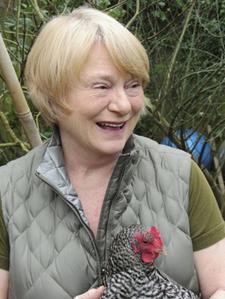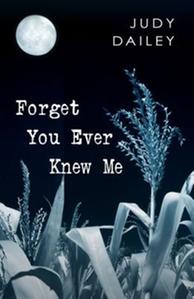
|
|
| photo: Marie Fredericks | |
Judy Dailey grew up on an 80-acre organic farm in Indiana and now lives on a 1,200-square-foot urban farm in Seattle, Wash., with her husband, six chicken and a dog. She has been a pilot, skydiver, spelunker, bicyclist, skier and night-time sailor, and managed a multimillion-dollar grant fund for affordable housing. She handcrafts artisan salami, beer and ricotta cheese. Her first mystery in the Urban Farm Series, Animal, Vegetable, Murder, was published in 2013. Forget You Ever Knew Me (just published by Five Star) is a suspense novel set in 1952.
On your nightstand now:
The Chemistry of Alchemy by Cathy Cobb, Monty Fetterolf and Harold Goldwhite. Besides mysteries, I enjoy books on subjects I know almost nothing about, like chemistry and alchemy. I don't always manage to finish them, but [this book has] a light-hearted approach that has kept me engaged. Also, I'm learning how to make gold in my kitchen from common household ingredients. How cool is that?
Three Graves Full by Jamie Mason. This book was recommended by my local independent bookstore, Third Place Books Ravenna in Seattle. My critique group meets there every Tuesday evening, and I almost always walk out with a staff pick. The first line of this book grabbed me: "There is very little peace for a man with a body buried in his backyard."
Lexicon by Max Barry. Also a staff pick from Third Place Books, it's billed as a "perfect cerebral thriller." Can't wait.
Scatter, Adapt, and Remember by Annalee Newitz. I am very concerned about global climate change; I've just read enough of this book to begin to see glimmers of hope.
Favorite book when you were a child:
The Secret Garden by Frances Hodgson Burnett--but only the first 75%, before all the philosophizing begins! I have always been fascinated by the power of secrets to change everything we know or believe about our lives. My mother died under mysterious circumstances when I was four years old. Even worse, my father and grandmother absolutely refused to discuss her life or her death. I investigated but never solved the mystery of my mother's death, but while writing Forget You Ever Knew Me, I discovered that fiction can be more insightful about the human heart than any recounting of facts.
Your top five authors:
P.G. Wodehouse. I started reading Wodehouse in the sixth grade, long before I understood all the jokes. He is a master of sleight-of-hand plotting and quick character sketches. He's my comfort-food author--when it's cold and rainy, I settle down in front of the fireplace with Pigs Have Wings or Right Ho, Jeeves and a cup of hot tea.
Peter Dickinson wrote intelligent and complicated stories steeped in postwar English society. His plots slowly and carefully curl back on themselves, so that the opening chapters have a different meaning by the time the story is finished.
There are several new mystery writers I hope will become favorites. Chief among these is Leonard Rosen, whose debut, All Cry Chaos, is a mind-stimulating brew of mathematical theory, international intrigue and unforgettable characters. I enjoyed Steve Hamilton's series about Alex McKnight, but The Lock Artist is his breakout book. S.J. Bolton's Lacey Flint stories aren't being written fast enough to suit me. Set in London with grim, interlocking stories and a wounded protagonist, they are an intriguing blend of romance and suspense--but never romantic suspense.
Book you've faked reading
Ulysses by James Joyce and Homer's Odyssey. Both were required reading at Bryn Mawr. I even fell asleep during the X-rated 1967 movie of Ulysses after lying my way in (I was underage). On the other hand, I loved how Reginald Hill played with the myth of Odysseus in his classic Arms and the Women to lend depth to both the hero (Andy Dalziel) and the villain.

The second half of Stephen King's On Writing is the most encouraging and useful discussion of how to be an author that I've ever read. It's the book I recommend when aspiring writers ask, "How did you get published?" King points out that successful writers do not have to be geniuses, but they do have to commit to writing every day in the same place at the same time. That's when creativity flows.
Book you've bought for the cover:
Everything I Need to Know I Learned from a Little Golden Book by Diane Muldrow. The cover shows a 1950s housewife, hatted, gloved and glowing in satisfaction with her role as wife and mother. The book, with the familiar gold binding, consists of page after page of illustrations from the Golden Books I remember from my childhood. Paging through it now, I'm struck by the lack of diversity. The 1950s both attract and repulse me because the appealing social veneer covered so many sins. That's why I chose to explore this period in Forget You Ever Knew Me.
Book that changed your life:
I read The Selfish Gene by Richard Dawkins in graduate school and it gave me a tool or a methodology for examining and understanding the world.
Favorite line from a book:
In Tana French's The Secret Place, Finn, a high-school-age boy, concludes, "It's pretty unlikely, just mathematically, that we're living in the one single era that happens to finally have everything figured out." I love this idea. When we become wrapped up in the crisis du jour, it's important to have a historical perspective to separate the urgent from the important.
Which character you most relate to:
Deanna Wolfe, the forest ranger in Prodigal Summer by Barbara Kingsolver. I want to be that strong, independent, solitary woman who knows her world in minute and scientific detail, but who also is open to love and life.
Book you most want to read again for the first time:
I've enjoyed most of Tana French's books but I was completely blown away by The Secret Place. The imagery is unforgettable, and she moves effortlessly from past to present, from third person to first person, and the plot unravels flawlessly. Finally, I loved the theme of girls struggling to become women in charge of their own fate.

